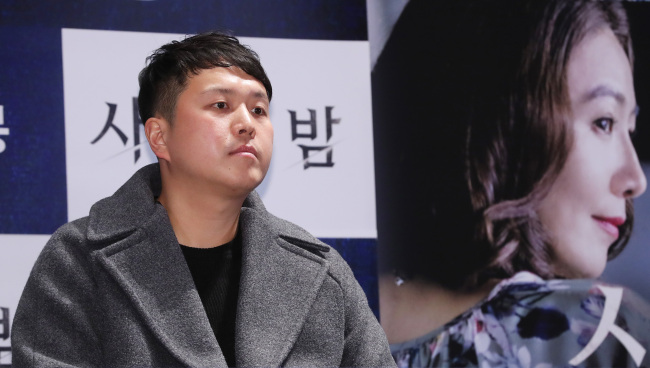Despite the disadvantage of not being distributed by powerhouses like CJ E&M, crime thriller “The Vanished” managed to stay afloat in the Korean box officer for nearly three weeks.
This is thanks to a strong story and good acting, along with solid directing by Lee Chang-hee. The first feature-length film of the young director knows how to depict the tumultuous state of men pushed to the edge, and use a plot twist effectively.
 |
| Lee Chang-hee is seen during a press conference after the premiere of “The Vanished” in Seoul on Feb. 28. (Yonhap) |
“This is not a film that looks at the characters from an objective point of view, but one that takes the viewpoint of one of the characters. It was important for me to calculate to which points the audience would be immersed in one character, and when they would be pulled out of that character and onto the next one,” Lee said, in an interview with The Korea Herald.
The movie uses sound, images and the dark settings of a morgue to dive deeper into the psychology of the main character Park Jin-han, a widower with a dark secret whose sanity hangs by a thread.
“I wanted Kim Kang-woo to play the role of Jin-han, all the way back from when I was writing the scenario. … He was cast later than other actors, and I heard that he was hesitant about taking on the role. I heard that and thought, ‘That’s classic Jin-han.’”
In Lee’s words, Jin-han is the opposite of Woo Jung-sik — by Kim Sang-kyung — in that he looks sharp and strong on the outside, but is actually feeble. Woo is the opposite in that he looks dumb but actually is very sharp-witted.
“The movie is one of contrast between Jin-han and Jung-sik,” he said.
Lee noted that there is tension from just the location — the narrow corridors of the morgue inside the National Forensic Service. He said it feels like Yoon Sul-hee’s world, the beautiful but controlling dead wife of Park toward whom he feels fear and guilt.
Shooting almost the entire film in one location seems to be a modus operandi for the up-and-coming director, who used a similar confined location in “Sogul,” the short film that he directed in 2011 which earned him his first critical recognition.
“You’d think that there’d be not much to show in a confined space, but there is plenty to work with. The thing with movies is that they are confined to physical space. A camera can walk through walls and once you’ve broke free of such restrictions, there are lots of interesting images,” he said.
In the film, the director not only restricted space but also time, in the scope of just one day. This was to explain the rapid change in characters, from a man of reason to one of emotions and irrational fears.
“The irony comes from the fear of the supernatural in what is supposed to be the most ‘rational’ place,” he said.
Attention to details is another aspect of Lee that stands out. The logo of Yoon’s company is a bird and she lives in a penthouse of a high-rise building, yet she is afraid of heights and flying. This, Lee said, was to hint at her character of yearning for something that she cannot have.
Still in the initial stage of his career, Lee said he is looking to establish his own style of directing.
“There are some movies that gets made, whoever the director is. But take a guy like Quentin Tarantino. You feel like his movies can only be made by him. The same story with Park Chan-wook,” he said.
David Fincher is another director Lee said he was most influenced by, mostly for his knack for toying with people’s psychology.
While Lee said he was not yet sure what his next project was going to be, he said he wants to direct a film that uses suspense as a major tool. It would be far-fetched to call his first big budget film a masterpiece, but it looks like Lee has potential in his quest to be like his heroes.
By Yoon Min-sik
(minsikyoon@heraldcorp.com)

